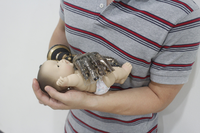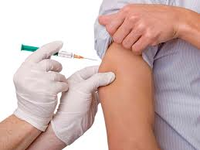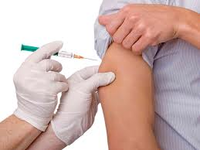
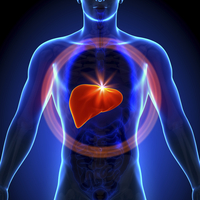
Fibroblast growth factor 21 (FGF-21) is a novel member of the
FGF-19 subfamily, which includes FGF-19, FGF-21, and FGF-23. The FGF-19 family
members are potent endocrine hormones in the regulation of a diverse
physiological homeostasis. FGF-21 is mainly expressed in the liver and is an important modulator of not only glucose and lipid metabolism but also energy balance.
Structure Necessary
for Bioactive Processing:

The
induction of signaling by FGF21 is a complicated process which results from the
formation of a ternary complex between FGFR1c, β-Klotho and FGF21. FGFR1c can
remain inactive in close proximity to β-Klotho in the absence of FGF21. When
FGF21 and β-Klotho are bound together they are able to dimerize FGFR1c in a way
that allows the activation of signaling.
Recent studies have demonstrated that understanding this complex process
and the structural relationship has significant implications for the
development of biological therapeutics.
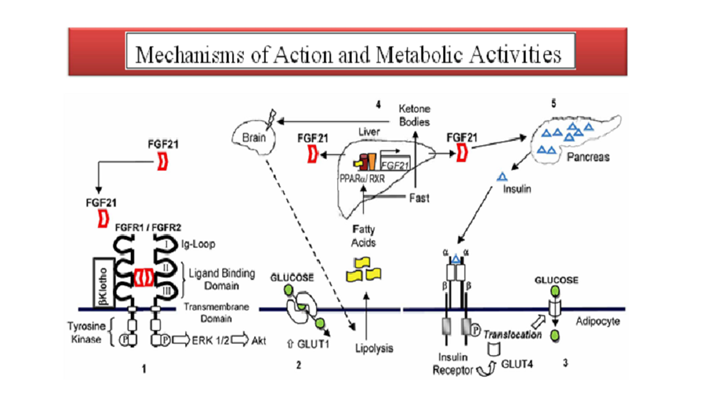
FGF21 is released by the liver into the bloodstream
and once in adipose tissue, it binds to its receptor (FGFR) forming a complex
with its co-receptor βKlotho. FGF21 then exerts its pleiotropic metabolic
effects through its actions on numerous targets, including adipose tissue,
liver, brain and pancreas. The expression of FGF21 is under the control of both
peroxisome proliferator-activated receptor gamma (PPARγ) and peroxisome
proliferator-activated receptor alpha (PPARα). FGF21 has been
identified as an important regulator of glucose, lipids, and energy balance.
Reasons to Measure FGF-21:
FGF-21 is a novel protein that has been identified as a useful biomarker for studying metabolic syndrome. Further research is needed for this analyte in order to better understand its precise pathophysiological role and its associated molecular pathways. Measuring FGF-21 may provide valuable insight for researchers in detecting, monitoring, and studying drug targets for a variety of individuals with various metabolic pathologies.
Diseases/conditions associated with elevated FGF-21 levels:
- Muscle-Manifesting Mitochondrial Respiratory Chain Deficiencies
- Nonalcoholic Fatty Liver Disease
- Medical Conditions Related to Type 2 Diabetes
- Gestational Diabetes
- Obesity
- Cushings Syndrome
- Renal Disease
References and Relevant Publications:
1 .Cuevas-Ramos, Daniel, et al. “The Role of Fibroblast Growth Factor 21 (FGF21) on Energy Balance, Glucose and Lipid Metabolism.”Current Diabetes Reviews, 2009,5, 216-220.
2 .Ge, Xuan et al. “Metabolic actions of FGF21: molecular mechanisms and therapeutic implications.” Diabetes and Obesity doi:10.1016/j.apsb.2012.06.011.
3 .Micanovic R, et al. “Different roles of N- and C- termini in the functional activity of FGF21.” J Cell Physiol. 2009 May;219(2):227-34.
4 .Potthoff, Matthew J. et al. “Endocrine fibroblast growth factors 15/19 and 21: from feast to famine.”Genes & Develeopment
5. Smith, Richard et. al.“FGF21 Can Be Mimicked In Vitro and In Vivo by a Novel Anti-FGFR1c/β-Klotho Bispecific Protein.” Plos One: DOI: 10.1371/journal.pone.0061432
6. Suomalainen, Anu et. al. “FGF-21 as a Biomarker for Muscle Manifesting Mitochondrial Respiratory Chain Deficiencies: a Diagnostic Study. The Lancet Neurology 2011; 10:806-818.
7. Yie J, et al. FGF21 N- and C-termini Play Different Roles in Receptor Interaction and Activation. FEBS Letters. 2009 Jan 5;583:19-24.
8. Yusuke, Murata,“FGF21 as an Endocrine Regulator in Lipid Metabolism: From Molecular Evolution to Physiology and Pathophysiology.” Journal of Nutrition and Metabolism; 2011: doi:10.1155/2011/981315
Related Kits:
FGF-21 ELISA










